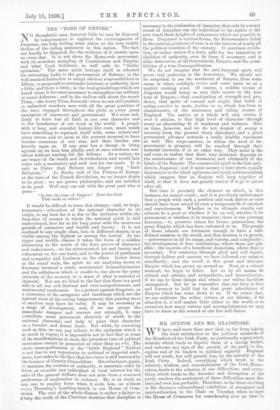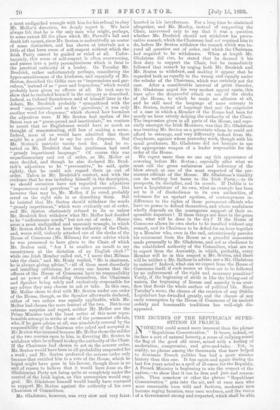MR. SEXTON AND MR. GLADSTONE.
WE have said more than once that, so far from taking the least satisfaction in the political misdeeds of the Members of the Irish Party, we profoundly regret every mistake which tends to deprive them of a strong leader, and welcome any sign of the growth of the party in dis- cipline and of its leaders in political sagacity. England will not profit, but will greatly lose, by the anarchy of the Irish Party. Indeed, everything which tends to the sobriety, wisdom, and reasonableness of the Irish Home- rulers, tends to the solution of our difficulties ; and every- thing which tends to the disorder and disruption of the party, renders the settlement of these difficulties more dis- tant and even less probable. Therefore, so far from exulting in Mr. Sexton's extraordinary exhibition of arrogance and insubordination to the Chair on Tuesday, when he kept the House of Commons for considerably over an hour in a most undignified wrangle with him for his refusal to obey Mr. Mellor's direction, we deeply regret it. We have always felt that he is the only man who might, perhaps, to some extent fill the place which Mr. Parnell's fall and death left vacant, since Mr. Sexton is undoubtedly an orator of some distinction, and has shown at intervals not a little of that keen sense of self-respect without which the Irish Party cannot be guided or ruled at all. Unfor- tunately, this sense of self-respect is often overweening, and passes into a petty peremptoriness which is fatal to the practical authority of a leader. On Tuesday Mr. Brodrick, rather unfortunately perhaps, considering the hyper-sensitiveness of the Irishmen, and especially of Mr. Sexton, described the Celtic race as " impecunious and gar- rulous," instead of as " poor and loquacious," which would probably have given no offence at all. He took care to show that he included himself in the category so described. Indeed, as Colonel Saunderson said of himself later in the debate, Mr. Brodrick probably. sympathised with the word ' impecunious,' and as for garrulous,' it was only another word for eloquence," which showed how harmless the adjectives were. If Mr. Sexton had spoken of the Saxon race as purse-proud and inarticulate," we venture to assert that no Englishman would have so much as thought of remonstrating, still less of making a scene. Indeed, most of us would have admitted that there might be a good deal to say for such dispraise. But Mr. Sexton's patriotic vanity took fire. And he re- torted on Mr. Brodrick that that gentleman had used " grossly impertinent language." Of course this was unparliamentary and out of order, as Mr. Mellor at once decided, and though he also declared Mr. Brod- rick's adjectives to be "provocative," he, said, quite rightly, that he could not regard them as out of order. Taken in Mr. Brodrick's context, and with the evidence that he was including himself in the description, we should ourselves have not regarded the adjectives "impecunious and garrulous" as even provocative. But however that may be, Mr. Mellor, if he erred, probably erred on the right side in so describing them. But he insisted that Mr. Sexton should withdraw the words " grossly impertinent," which were evidently out of order, and Mr. Sexton obstinately refused to do so unless Mr. Brodrick first withdrew what Mr. Mellor had decided to be "unfortunate words," but not out of order. Hence arose a most undignified and unseemly wrangle, in which Mr. Sexton defied for an hour the authority of the Chair, and, worse still, violently attacked one of the clerks of the House of Commons (Mr. Milman) for some advice which he was presumed to have given to the Chair, of which Mr. Sexton said, " Am I to swallow an insult to my countrymen at the dictation of an English clerk ?" while one Irish Member called out, " I move that Milman take the chair," and Mr. Healy replied, " He is chairman, he is always giving advice,"—all of them most disorderly and insulting criticisms, for every one knows that the officers of the House of Commons have no responsibility and no power of defending themselves, the Chairman and Speaker being solely and exclusively responsible for any advice they may choose to ask or take. In this case, Mr. Mellor chose to deal with Mr. Sexton under one order of the House, though, as the Speaker afterwards declared, either of two orders was equally applicable, while Mr. Mellor had chosen the more lenient of the two. But to our extreme surprise and regret, neither Mr. Mellor nor the Prime Minister took the least notice of this most repre- hensible attempt to strike at one of the permanent officials, who, if lie gave advice at all, was absolutely covered by the responsibility of the Chairman who asked and accepted it. Mr. Sexton was incensed because Mr. Mellor chose the milder of the two courses open to him, in directing Mr. Sexton to withdraw when he refused to obey the authority of the Chair. If the Chairman had chosen to act on the severer order, Mr. Sexton would have been in all probability suspended for a week ; and Mr. Sexton preferred the severer order only because that entitled him to a vote of the House, which he hoped might have gone in his favour, though there is no sort of reason to believe that it would have done so, the Gladstonian Party not being quite so completely under the control of the Irish legion, as this assumption would sug- gest. Mr. Gladstone himself would hardly have ventured to support Mr. Sexton against the authority of his own Chairman of Committees.
Mr. Gladstone, however, was very slow and very faint- hearted in his interference. For a long time he abstained altogether, and Mr. Morley, instead of supporting the Chair, intervened only to say that it was a question whether Mr. Brodriek should not withdraw his provo- cative remark, which the Chairman had not required him to do, before Mr. Sexton withdrew the remark which was be- yond all ,question out of order, and which the Chairman had required to be withdrawn. When at length Mr. Gladstone did rise, he stated that he deemed it his first duty to support the Chair, but he immediately followed that remark by urging both Mr. Brodrick and Mr. Sexton to withdraw, and making it appear that he regarded both as equally in the wrong and equally under the rebuke of the Chairman, which was certainly not the case. After a considerable interval of great disorder, Mr. Gladstone urged his very modest appeal again, this time after the disgraceful attack on one of the clerks of the House, to which he made no allusion at all, and he still used the language of mere entreaty to Mr. Sexton, instead of language that met the exigencies of a case in which a Member of the House had been for nearly an hour utterly defying the authority of the Chair. The impression given in all parts of the House, and espe- cially amongst the Irish Members, was that Mr. Gladstone was treating Mr. Sexton as a potentate whom he could not afford to estrange, and very differently indeed from Mr. Conybeare, against whom yesterday week, though with his usual gentleness, Mr. Gladstone did not hesitate to use the appropriate weapon of a leader responsible for the order of the House.
We regret more than we can say this appearance of cowering before Mr. Sexton ; especially after what we must call the gross unfairness and indecency of the blow struck at one of the most respected of the per- manent officials of the House. Mr. Gladstone's timidity can do nothing but harm to the Irish Party,—to its prospects, its discipline, and its morale. If Dublin is to have a Legislature of its own, what an example has been set to it of disobedience to its own authorities, of tolerance for an upstart egotism, of contemptuous in- difference to the rights of those permanent officials who have no power to defend themselves, and whose usefulness wholly depends on the courageous support of their re- sponsible superiors ! If these things are done in the green tree, what will be done in the dry ? If the House of Commons allows its own clerks to be insulted without any remark, and its Chairman to be defied for an hour together by a Member who, even in the end, ostentatiously parades his retirement from the House as a graceful concession made personally to Mr. Gladstone, and not as obedience to the established authority of the Committee, what are we to expect from the Assembly, in which, probably, every Member will be in this respect a Mr. Sexton, and there will be neither a Mr. Balfour to advise, nor a Mr. Gladstone to entreat ? Indeed, what can we expect from the House of Commons itself, if such scenes as these are to be followed by no enforcement of the right and necessary penalties? Verily, if the beginning of strife is like the letting-out of waters, the beginning of license and anarchy is an over- flow that floods the whole surface of political life. Since Tuesday's scene, the chance of the creation of any Dublin Legislature has dwindled greatly, and the chance of any early resumption by the House of Commons of its ancient orderly and honourable traditions has well-nigh dis- appeared.



































 Previous page
Previous page